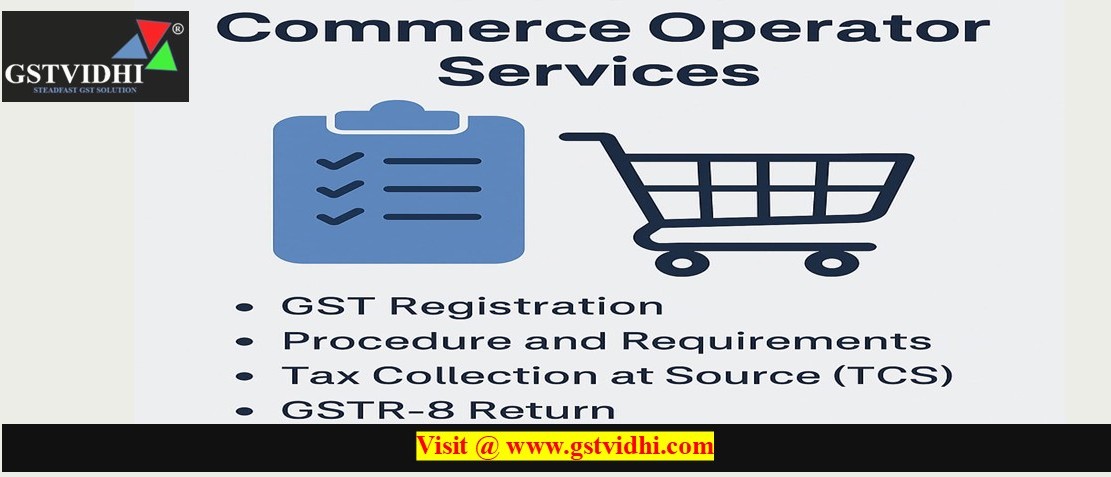
GST on Electronic Commerce Operators (ECOs): A Complete Guide
Understanding GST
Registration, TCS, Return Filing, and Compliance for Platforms like Amazon,
Zomato, and Ola
The rise of digital
platforms has transformed the way businesses reach customers. E-commerce
marketplaces, food delivery apps, ride aggregators, and hotel booking portals
are increasingly becoming the primary interface between sellers and consumers.
Under the Goods and Services Tax (GST) regime, such platforms are categorized
as Electronic Commerce Operators (ECOs) and are governed by specific
compliance rules.
This article provides a
complete guide to GST provisions applicable to ECOs, covering registration, TCS
(Tax Collection at Source), return filing, reverse charge liability, late fees,
and practical compliance tips.
Who is an
Electronic Commerce Operator?
An Electronic Commerce
Operator (ECO) is defined under Section 2(45) of the CGST Act, 2017
as any person who owns, operates, or manages a digital or electronic facility
or platform for electronic commerce.
In simpler terms, ECOs
are platforms that facilitate the supply of goods or services (or both) over
digital channels. This includes:
- E-commerce Marketplaces:
Amazon, Flipkart, Snapdeal
- Food Delivery Platforms:
Swiggy, Zomato
- Cab Aggregators:
Ola, Uber
- Hotel/Travel Booking Portals:
OYO, MakeMyTrip, Goibibo
These platforms either
collect consideration on behalf of suppliers or provide the interface for
transaction facilitation.
GST
Registration for ECOs
GST registration is
mandatory for every ECO, regardless of their turnover.
Unlike regular businesses that enjoy threshold exemptions (₹20 lakh or ₹40
lakh, depending on the type of supply), ECOs are not eligible for any
exemption.
Whether the ECO is
operating in a single state or across India, registration is compulsory even if
the turnover is zero. This ensures the government's ability to track digital
transactions and tax collection efficiently.
Requirements
for GST Registration
Before applying for
registration, an ECO must have the following:
- PAN of the
business entity (proprietor, firm, company)
- Proof of principal place of business
(such as an electricity bill, rent agreement, or property tax receipt)
- Bank details
(account number, IFSC code, cancelled cheque or bank statement)
- Authorized signatory details,
including PAN, Aadhaar, mobile number, and email for OTP verification
- Digital Signature Certificate (DSC)
(mandatory for LLPs and companies)
Once these documents are
uploaded and verified on the GST portal, the GST registration
certificate (Form REG-06) is typically issued within 7 working days.
Tax
Collection at Source (TCS) Under GST
One of the most
significant obligations for ECOs is Tax Collection at Source (TCS) under
Section 52 of the CGST Act, 2017. If the ECO collects consideration on
behalf of suppliers, it must deduct TCS at 1% on the net value of
taxable supplies made through the platform.
TCS Rate Break-up:
- CGST:
0.5%
- SGST/UTGST:
0.5%
- IGST:
1% (for inter-State supplies)
TCS is not applicable
if the ECO does not collect payment from customers. TCS must be deposited
with the government within 10 days from the end of the month in which the
supply was made.
GSTR-8:
Monthly Return Filing for TCS
All registered ECOs
liable to collect TCS must file GSTR-8, a monthly return under GST.
Key Details in GSTR-8:
- Supplies made through the ECO
platform
- TCS collected on behalf of each
supplier
- Supplier GSTINs
- Adjustments for sales returns or
cancellations
The due date for
filing GSTR-8 is the 10th of the following month. The TCS collected is
credited to the respective suppliers’ electronic cash ledger, which they
can use to discharge their tax liability.
Failure to file GSTR-8
timely may lead to interest and late fees.
Reverse
Charge Mechanism (RCM) on ECO Services
In certain cases, GST law
shifts the tax liability from the supplier to the ECO under the Reverse
Charge Mechanism (RCM). This happens only when the actual supplier is
unregistered.
Examples of RCM on ECOs:
- Ola/Uber
must pay GST on ride fares when driver-partners are unregistered.
- Swiggy/Zomato
are liable to pay GST on behalf of unregistered restaurants.
This ensures the tax is
collected even when suppliers fall below the GST threshold or fail to register.
Late Fee
and Interest for Delay in GSTR-8 Filing
Late Fee (Under Section
47 of CGST Act):
- ₹100 per day under CGST + ₹100
per day under SGST
- Total = ₹200 per day
- Maximum late fee capped at ₹5,000
(combined CGST + SGST)
Interest on Late TCS
Payment (Section 50 of CGST Act):
- 18% per annum
- Calculated from the due date till
the actual payment date
These penalties apply
when there is a delay in filing GSTR-8 or depositing the collected TCS into the
government account.
Conclusion
Electronic Commerce
Operators play a crucial role in India’s digital commerce landscape, but that
role comes with enhanced compliance responsibilities. From mandatory
registration to TCS deductions, monthly returns, and liability under reverse
charge, the GST law creates a separate set of rules tailored to ECOs.
For seamless operations
and risk-free business, it is essential that ECOs stay ahead in compliance.
Non-compliance may result in penalties, loss of credibility, and disruptions in
vendor relations.
With a well-structured
GST compliance plan, ECOs can ensure smooth business operations, build trust
with suppliers and customers, and contribute to transparent tax administration.
Disclaimer: All the Information is based on the notification, circular advisory and order issued by the Govt. authority and judgement delivered by the court or the authority information is strictly for educational purposes and on the basis of our best understanding of laws & not binding on anyone.
Click here